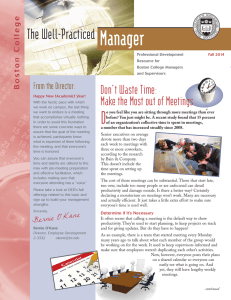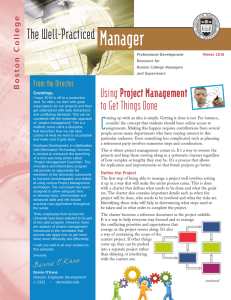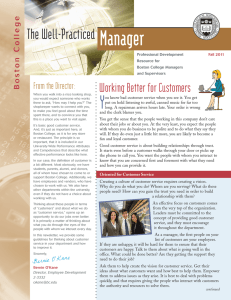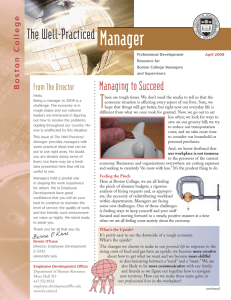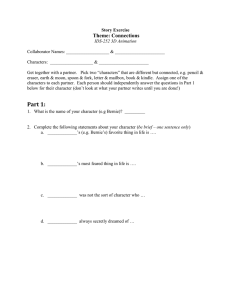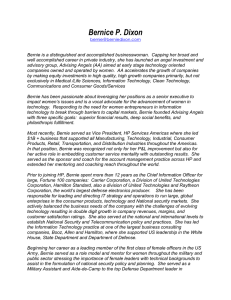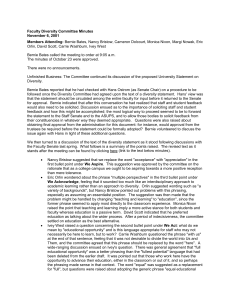The Well-Practiced
advertisement
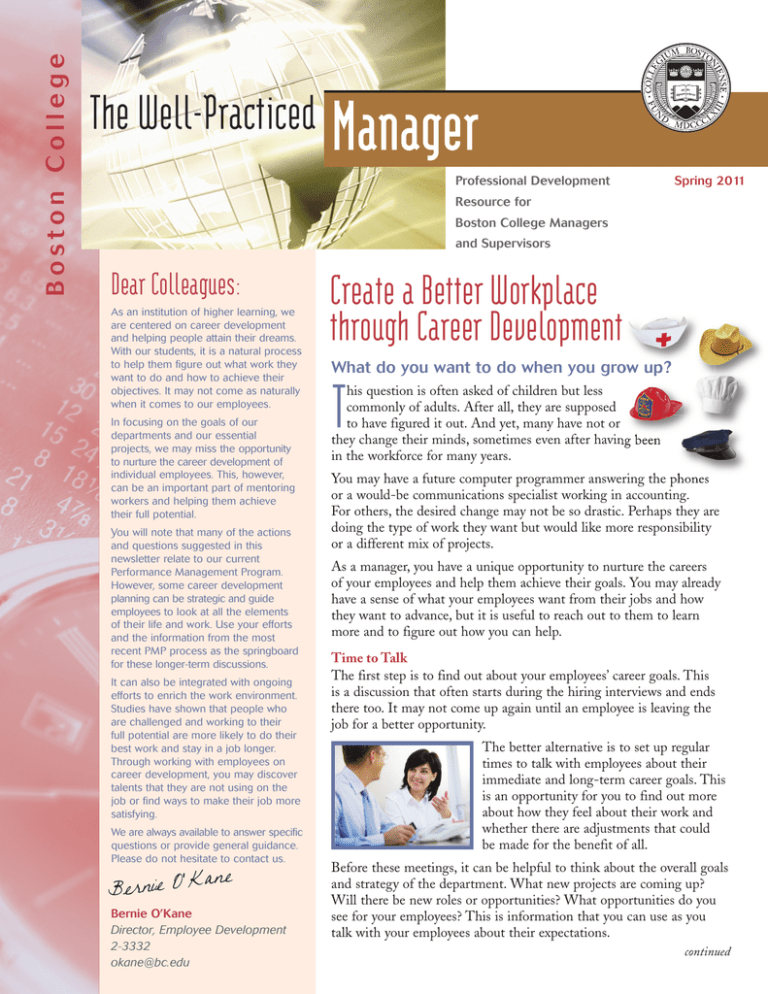
Boston College The Well-Practiced Manager Professional Development Spring 2011 Resource for Boston College Managers and Supervisors Dear Colleagues: As an institution of higher learning, we are centered on career development and helping people attain their dreams. With our students, it is a natural process to help them figure out what work they want to do and how to achieve their objectives. It may not come as naturally when it comes to our employees. In focusing on the goals of our departments and our essential projects, we may miss the opportunity to nurture the career development of individual employees. This, however, can be an important part of mentoring workers and helping them achieve their full potential. You will note that many of the actions and questions suggested in this newsletter relate to our current Performance Management Program. However, some career development planning can be strategic and guide employees to look at all the elements of their life and work. Use your efforts and the information from the most recent PMP process as the springboard for these longer-term discussions. It can also be integrated with ongoing efforts to enrich the work environment. Studies have shown that people who are challenged and working to their full potential are more likely to do their best work and stay in a job longer. Through working with employees on career development, you may discover talents that they are not using on the job or find ways to make their job more satisfying. We are always available to answer specific questions or provide general guidance. Please do not hesitate to contact us. ane Bernie O’K Bernie O’Kane Director, Employee Development 2-3332 okane@bc.edu Create a Better Workplace through Career Development What do you want to do when you grow up? T his question is often asked of children but less commonly of adults. After all, they are supposed to have figured it out. And yet, many have not or they change their minds, sometimes even after having been in the workforce for many years. You may have a future computer programmer answering the phones or a would-be communications specialist working in accounting. For others, the desired change may not be so drastic. Perhaps they are doing the type of work they want but would like more responsibility or a different mix of projects. As a manager, you have a unique opportunity to nurture the careers of your employees and help them achieve their goals. You may already have a sense of what your employees want from their jobs and how they want to advance, but it is useful to reach out to them to learn more and to figure out how you can help. Time to Talk The first step is to find out about your employees’ career goals. This is a discussion that often starts during the hiring interviews and ends there too. It may not come up again until an employee is leaving the job for a better opportunity. The better alternative is to set up regular times to talk with employees about their immediate and long-term career goals. This is an opportunity for you to find out more about how they feel about their work and whether there are adjustments that could be made for the benefit of all. Before these meetings, it can be helpful to think about the overall goals and strategy of the department. What new projects are coming up? Will there be new roles or opportunities? What opportunities do you see for your employees? This is information that you can use as you talk with your employees about their expectations. continued 2 ■ ■ ■ ■ ■ ■ ■ ■ The initial discussions will essentially be interviews as you help your workers define their career aspirations. Some will have very well developed plans while others are searching for ideas. Time to Plan As a manager, you know that little gets accomplished without a solid plan of action. You can help your employees develop that plan and integrate their goals into those you have for the office. ■ ■ ■ ■ ■ ■ stay Why do people in an organization? ■ ■ ■ ■ 1. Exciting work and challenge ■ ■ ■ ■ 2. Career growth, learning and development Start with open ended questions such as, “What do you like most about your current job?” or “Where would you like to be in five years or ten years?” ■ ■ Some employees may be intimidated by your interest or they may be leery of sharing too much information. Be patient. Be sincere. Assure them that your goal is to make the work place better for everyone. ■ 3. Working with great people ■ ■ ■ 4. Fair pay 5. Supportive management / good boss ■ ■ ■ ■ ■ 6. Being recognized, valued and respected ■ ■ ■ 7. Benefits ■ 8. Meaningful work and making a difference ■ 9. Pride in the organization, its mission and its product ■ ■ ■ ■ ■ ■ In some cases, you will find that employees are satisfied with their professional growth and on track. Even if this is the case now, it is good to check back with them periodically to see if things change. Keep an open mind. You may be surprised at what you hear. You may find that people you thought were satisfied with their job are not. You may find that someone you thought wanted a promotion really does not. Help them determine a realistic, long term time table. Then, help them determine what steps need to be taken to achieve their goals. Will they need more training? Do they need a degree? What skills should they develop? Are there workshops that could help? Could they take on new responsibilities at work? What else can you do to help? You may not be able to offer them an immediate promotion or a big raise. Be honest about your limitations and explore options with them. Are there opportunities in other departments? Can you put them in touch with others who might have good advice? Could you include them on different projects? Once the plan is in place, continue to talk with employees regularly about their career goals and ongoing development. Their goals may change over time and as they explore their options and it will be helpful to you and them to make adjustments accordingly. ■ 10. Great work environment and culture Source: Love ’Em or Lose ’Em by Beverly Kaye and Sharon Jordan-Evans, Berrett-Koehler Publishers, Inc. Career development discussion questions The discussion will vary depending on the individual. Some will have specific goals and a strong sense of what they want while others may not know what to do next. Asking open ended questions will help get the discussion started. Then you can ask more leading questions to help develop a specific plan. Starting the conversation: • What is the most interesting task you did over the last 12 months? • What motivates you at work? • What has been challenging? • What is your least favorite responsibility at work? • In thinking about your past positions, what was your favorite and why? Move on to planning: • What skills do you want to develop? • What three things do you want to do in the next six months to achieve your goal? • What sort of on-the-job training might help? • What can I do to help? • What do you know about the career development resources at Boston College? Editorial Services provided by Jennifer Powell, The Excellent Writers Group, excellentwriters.com Graphic Design by Tania Fine Helhoski, BirdDesign, www.birddesignstudio.com Employee Development Office Department of Human Resources • More Hall 315 617.552.8532 • employee.development@bc.edu • www.bc.edu/ed ?
